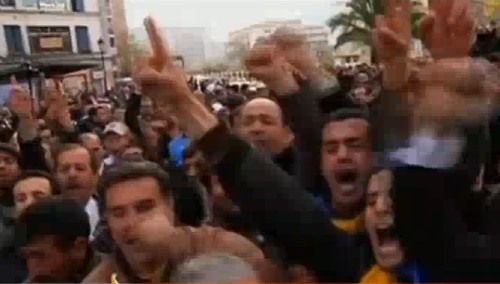Screenshot of Algerians protesting on February 12. by Al Jazeera English
Thousands of demonstrators came out to demonstrate against President Abdelaziz Bouteflika's regime in Algeria on February 12. Security forces arrested hundreds of protesters, including human rights activists and syndicate members of the General Union of Algerian Workers.
A peaceful sit-in led to 100 being detained.
Al Jazeera reported Algerians, inspired by the success of the popular revolution in Egypt, were "heavily outnumbered by riot police," but "2,000 protesters were able to overcome a security cordon enforced around the city's May First Square" and join others calling for reform.
Initially, security forces closed all entrances to the capital city of Algiers. And, according to Al Jazeera, early in the day, "Police charged at demonstrators and arrested 10 people outside the Algiers offices of the opposition Rally for Culture and Democracy (RCD), as they celebrated Mubarak's downfall, Said Sadi, RCD leader, told the AFP news agency." Sadi found the police presence to be "unbelievable."
Al Jazeera described the presence: 40 police vans, jeeps and buses lined up at May First Square, starting point of the protesters' march; small military-style armoured vehicles which are rarely seen in the city, were parked at several junctions; police outside of fuel stations were wearing anti-riot body armor.
RCD activist Sadi and Algerian opposition to Bouteflika are actually the subject of part of a cable released by WikiLeaks. 07ALGIERS1806 from December 2007 shows that opposition to Bouteflika has been brewing for years. It paints a picture of an "ailing and fragile" regime:
On December 3, opposition Rally for Culture and Democracy (RCD) leader Said Sadi presented a somber overview of the Algerian regime, saying it insisted on continued control but lacked vision and capacity. Sadi warned that in the context of current stagnation in economic and political reform, Algeria's institutions were corroding from within, losing many of their best cadres of workers and civil servants. The former leader of the Islamist al-Islah party, Abdallah Djaballah, who was ousted from the party's leadership with active help from the Interior Ministry, pointed out to us on December 17 that the harraga phenomenon (ref A), in which youth flee on makeshift crafts to Europe, was no longer limited only to poor, unemployed youth. Djaballah viewed Algerian youth as having a choice "between death at sea and a slow, gradual death at home" given the profound lack of opportunities in the country's stagnant economy. Sadi told us he was shocked to find so many educated, middle-class Algerians in Quebec and parts of the U.S. on a recent visit. "Those people are the future of Algeria," Sadi said.
The cable goes on to say, ordinary Algerians "have already lost confidence in the economic and political reform agenda, are now losing faith in the ability of the regime to protect them" from terrorism. It describes how "there is a growing gap between what ordinary Algerians see as their key needs and what they perceive the government is offering in terms of wages and quality of life." And, it suggests that "fewer Algerians are willing to help the government" so if Algerians have to do business in a government office they will go but then "leave promptly and stay out of the way."
Interestingly, a women's rights activist named Laila Aslaoui is mentioned explaining how the Bouteflika regime asked her to help organize a march condemning terrorism. She said she would have helped in the 1990s but now had no interest in helping "the Algerian government justify its approach to security."
The Bouteflika regime has been weary over the possibility that they might meet the same fate that the Mubarak regime just faced. The Guardian reported, "In an effort to stop mass protests, Bouteflika said he would use the country's vast oil and gas wealth to lower the prices of key foods. He also promised to allow more democratic freedoms, create jobs and lift a 19-year-old state of emergency that still hangs over the country.
Despite concessions, coalitions or organizations like the National Co-ordination for Change and Democracy (CNCD) have been defying the regime. Inspired by other uprisings in the region and the growing impact of unemployment, high food costs, poor housing and corruption, issues that many north African nations are finding themselves faced with, have fueled pro-democracy actions.
The human rights organization Amnesty International urged the Bouteflika regime on February 11 to not crack down on planned anti-government protests. It called on the regime to let the protesters "express themselves freely" and highlighted the fact that during riots in January three people were killed and eight hundred were injured. The organization along with CNCD called for the release of prisoners of conscience and other detainees arrested during other protests.
The demonstrations in Algeria garnered a hashtag: #Feb12. The last time a day of demonstrations earned a hashtag a revolution unfolded and a leader that had been in power for over three decades quickly became illegitimate and fled the country for a Red Sea resort.
Al Jazeera undoubtedly played a key role in getting information out on the Egypt revolution in its early stages. The news organization has launched a live blog on Algeria. It also has put together this slick presentation showing a "timeline of opposition" in Algeria:
(Note: You can view every article as one long page if you sign up as an Advocate Member, or higher).






